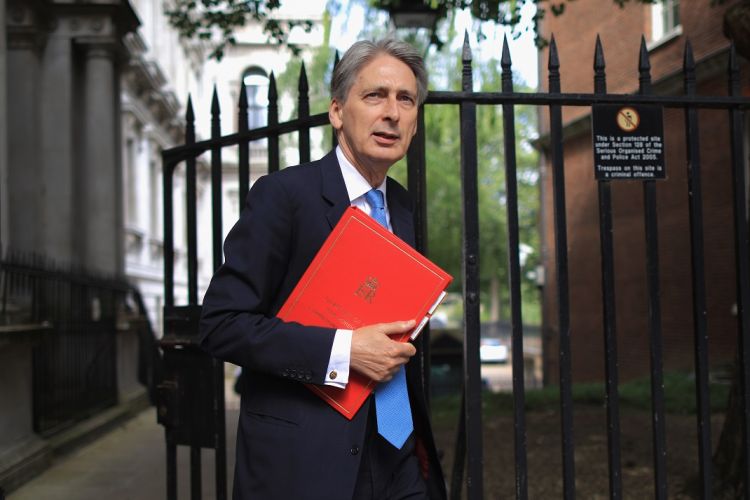Five reasons why austerity is going nowhere

Today the Chancellor of the Exchequer delivered a Budget that fell far short of what UK workers needed.
Last week, we set five tests for the government to prove that austerity is “over”, as the Prime Minister promised at this year’s Conservative Party conference.
Our tests were simple:
- Action to tackle the wage growth crisis
- An end to social security cuts
- A proper pay rise for public servants
- More money for public services
- Proper investment in the UK economy
Today’s Budget failed them all. Here’s why:
1. Not enough action on wages
With UK workers suffering the longest squeeze on real wages in modern history, we wanted the government to boost wages by increasing the minimum wage to £10 as quickly as possible.
And because we know that union members earn more, we also wanted ministers to strengthen collective bargaining rights and allow all unions access to workplaces.
Today's announcement of a 4.9 per cent increase in the minimum wage for over 25-year-olds will deliver a modest real wage increase when it comes into force next April.
But if the National Minimum Wage is to really live up to its name, ministers need to go beyond this target – and soon.
Otherwise UK workers will have to put up with the wage squeeze for some time to come.
2. Ploughing on with Universal Credit
There were fundamental design and delivery problems with Universal Credit even before the government cut its budget in 2015.
Today the Chancellor announced an additional £1 billion to fund extra protections for claimants moving onto UC, but this is still not enough to undo the damage.
On top of this, Mr Hammond made a lot of noise about raising the UC work allowances by £1000 from April 2019 to increase the amount that claimants can earn before UC is tapered.
But according to the OBR, this only reverses half the savings associated with the 2015 Summer Budget cuts.
In any case, no amount of money can fix a fundamentally flawed policy.
Yet the government remains determined to plough ahead with the full rollout of UC next year, despite calls across the political divide for it to be scrapped once and for all.
There was also nothing in today’s Budget about the freeze on working-age benefits, which has been linked to the growing use of foodbanks.
The failure to deal with the benefits freeze and UC means austerity is set to continue for millions of working families.
3. Public sector pay scandal
Hardworking teachers, firefighters and NHS staff have paid a heavy price for austerity over the last eight years, with the average public servant losing £2553 in real pay since 2008.
While the Chancellor stressed today that he “wants to see higher wages for those in work”, there was little comfort for those public sector workers who continue to see below inflation pay rises – including most teachers, civil servants, police and prison officers.
With funding outside the NHS flat across the spending review period, the burden for meeting pay awards will continue to fall on overstretched departmental budgets.
And beyond 2019/20, we still have no news on how the Treasury will pick up the tab for the increased pension contributions that will result from their changes to the way future costs are calculated.
4. Public services funding crisis
Earlier this year the Chancellor promised there would be “light at the end of the tunnel” for our cash-strapped public services.
And we were clear last week that the extra £20 billion promised for the NHS had to be new money – not money stolen from budgets elsewhere.
In the end the Chancellor was able to use better than expected tax receipts to cover the cost of the extra NHS cash – but this has swallowed up all the additional money he had to play with.
And when the extra cash for the NHS is stripped out, funding for public services is essentially flat.
That means any future spending increases for schools or the police will come at the expense of other departments.
And there will only be additional funding if the economy gets a boost from a favourable Brexit deal, which is looking increasing unlikely.
5. No long-term plan on investment
Public sector net investment has fallen from £46 billion in 2010/11 to £41 billion between 2017/18.
Last week we called on the Chancellor to put this right by increasing public infrastructure investment by £20 billion, which would bring the UK in line with the OECD average.
We also need a National Investment Bank that will focus on rebuilding the country, not building bigger profits.
But today, Philip Hammond had nothing significant to say on public investment.
In fact, spending on Capital Departmental Infrastructure is due to fall by £800 million by 2023/24.
And investment over the next five years will still average 2.8% of GDP – way below the OECD average of 3.2%.
So it's clear the UK economy is still not going to get the investment it needs any time soon.
Stay Updated
Want to hear about our latest news and blogs?
Sign up now to get it straight to your inbox
